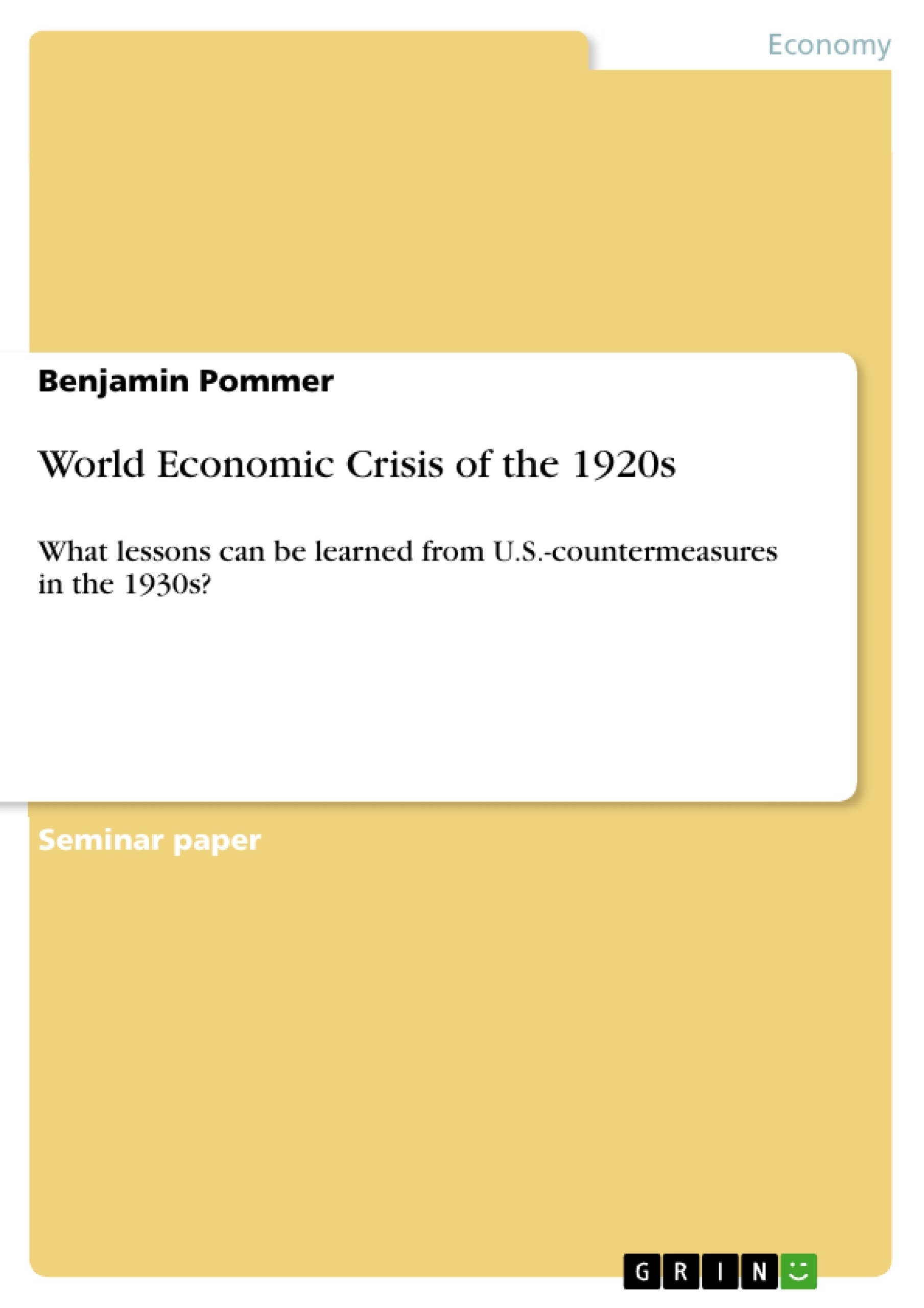The Great Depression was one of the worst economic crises in the history of man-kind. All former great powers suffered from high debts and unemployment. The United States got hit very hard, because of the connection to debt countries, which were additionally indebted among each other like Germany, Great Britain and France. The reasons for the severe effects on the United States can be found in the several fields of economics.
The presidents Herbert Hoover and Franklin D. Roosevelt dominated the U.S. re-sponse to the Great Depression. Both presidents had different point of views on the crises, from where they initiated fiscal, monetary and social programs. It was not easy to convince the people of tough measures in times of increasing distrust into economy. The lack of public support in combination with less successful initiatives is one of the reasons, why Hoover failed in the election.
All identified lessons learned are not a blueprint for further recessions. The political context and the scientific basis have a decisive impact. Governments, businesses and consumers are responsible for a stable economic environment. Profit has to be on a sustainable basis flanked by moderate monetary measures.
Table of Contents
- Executive Summary
- Table of Contents
- Introduction
- Problem definition
- Aim of the Assignment
- Scope of Work
- Reasons for the economic crisis
- Supply of goods
- Monetary issues
- Consumption
- Stock exchange crash
- The Gold standard
- The U.S. and the Great Depression
- President Hoover's initiatives
- President Roosevelt's New Deal
- Lessons learned
- Conclusion
- References
- ITM Checklist
Objectives and Key Themes
This paper aims to explore the reasons for the Great Depression and the countermeasures taken by the United States to overcome it. It examines the lessons learned from US countermeasures in the 1930s, particularly focusing on the Roosevelt administration's monetary reforms and public investments. The paper aims to identify and evaluate applicable lessons learned for future crises, recognizing the unique context of each economic downturn.
- Causes of the Great Depression
- Impact of the Depression on the United States
- U.S. Government Response to the Crisis
- Effectiveness of Countermeasures
- Lessons Learned for Future Economic Crises
Chapter Summaries
- Introduction: This chapter sets the stage by defining the problem, outlining the assignment's aim, and establishing the scope of the analysis. It emphasizes the importance of understanding economic cycles, the impact of extreme situations on consumer behavior, and the challenges of comparing historical recessions.
- Reasons for the economic crisis: This chapter delves into the various factors that contributed to the Great Depression. It discusses the supply of goods, monetary issues, consumption patterns, the stock exchange crash, and the role of the gold standard in exacerbating the crisis.
- The U.S. and the Great Depression: This chapter focuses on the U.S. response to the Depression, examining the initiatives of Presidents Hoover and Roosevelt. It explores the differences in their approaches to the crisis and the effectiveness of their respective policies.
- Lessons learned: This chapter analyzes the key lessons learned from the U.S. response to the Great Depression. It explores the implications of these lessons for future economic crises and the importance of a stable economic environment.
Keywords
The main focus of this paper is on the economic crisis of the 1920s, specifically the Great Depression and the U.S. response to it. The key themes explored include government intervention, monetary policy, fiscal policy, economic protectionism, and the impact of international debt. It delves into the strategies implemented by Presidents Hoover and Roosevelt, including the New Deal, and analyzes their effectiveness in stimulating economic recovery. The paper examines the lessons learned from this historical crisis, highlighting the need for proactive measures to address future economic downturns.
Frequently Asked Questions
What were the main causes of the Great Depression?
The crisis was caused by a combination of goods oversupply, monetary issues, shifts in consumption, the 1929 stock market crash, and the limitations of the Gold Standard.
How did President Hoover respond to the crisis?
Hoover initiated several fiscal and social programs, but a lack of public support and the perceived ineffectiveness of his measures led to his defeat in the next election.
What was Roosevelt's "New Deal"?
The New Deal was a series of programs and reforms, including public investments and monetary changes, designed to provide relief, recovery, and reform during the 1930s.
Why was the United States hit so hard by the crisis?
The U.S. was deeply connected to other indebted countries like Germany, Great Britain, and France, creating a global domino effect of economic failure.
What lessons can be learned for future recessions?
While not a direct blueprint, the study highlights the need for proactive government measures, sustainable profit models, and moderate monetary policies.
- Quote paper
- M.A. Benjamin Pommer (Author), 2014, World Economic Crisis of the 1920s, Munich, GRIN Verlag, https://www.grin.com/document/279595



